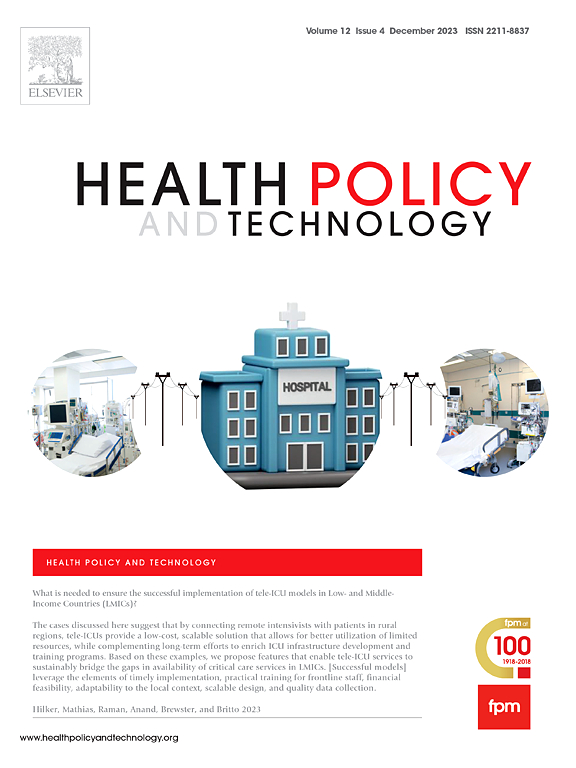评价加拿大临床试验远程访问框架(CRAFT)试点:一项定性研究
IF 3.7
3区 医学
Q1 HEALTH POLICY & SERVICES
引用次数: 0
摘要
目的临床试验为患者提供了获得新的诊断筛选、治疗和支持性护理选择的机会。由于分布和距离癌症临床试验中心的距离,许多加拿大人获得试验的机会有限。在2021-23年,加拿大临床试验远程访问框架(CRAFT)作为概念验证(PoC)试点实施,通过为居住在大都市地区以外的患者提供试验机会来减少这些不公平现象。CRAFT涉及一个“主要”站点,该站点将具体的试验责任委托给区域“卫星”中心,以形成一个“试验集群”。我们的目标是评估CRAFT在加拿大三个省实施的试点:不列颠哥伦比亚省、安大略省和纽芬兰省。方法我们在主要和辅助地点招募参加PoC的医疗保健专业人员。两位研究者采用演绎和归纳编码的框架,运用不断比较的原则对访谈数据进行独立分析。分歧通过协商一致解决了。结果对来自不列颠哥伦比亚省(n=4)、安大略省(n=6)和纽芬兰省(n=3)的参与者进行了13次一对一访谈。与会者赞同CRAFT是改善服务不足人群公平获得实验性疗法的手段;提高区域保健小组的技能;将卫星与主站点结合起来;并重新设想未来的试用交付。挑战包括在较小的中心负责合同审查和批准,协调研究服务和跨站点的高级管理支持。结论卫生保健团队支持CRAFT,以改善公平获得试验和提高研究能力。2025年3月,所有相关方的后续研讨会解决了在研究、技术和治理基础设施方面需要改进的问题,以便将CRAFT扩展到新的司法管辖区。临床试验为患者获得新的和创新的治疗方法创造了机会,据报道,临床试验活动改善了卫生系统的绩效。然而,生活在农村和偏远地区的患者在参加试验方面面临障碍,包括前往大都市中心进行试验所需的资金、时间和医疗费用。分散临床试验服务,其中一些与试验有关的活动在区域医院进行,可以帮助减轻这些不公平现象。本研究从参与试点的医疗保健专业人员的角度,评估了2021-2023年加拿大三个省肿瘤学临床试验远程访问框架(CRAFT)的试点示范。该框架得到了卫生保健专业人员的认可,以帮助减少试验获取方面的不公平现象并提高研究能力。研究结果表明,需要更好的基础设施支持(例如,合同审查、信息技术整合)和监管支持(例如,降低卫生当局之间的障碍)来将社区医院与主要试验点联系起来。还需要熟悉分散流程的临床试验办公室将该模式推广到其他省份和疾病。本文章由计算机程序翻译,如有差异,请以英文原文为准。
Evaluation of the Canadian Remote Access Framework for Clinical Trials (CRAFT) Pilot: a Qualitative Study
Objectives
Clinical trials provide opportunities for patients to access novel diagnostic screening, treatment, and supportive care options. Trial access is limited for many Canadians due to distribution and distance from cancer centres with clinical trials. In 2021-23, the Canadian Remote Access Framework for Clinical Trials (CRAFT) was implemented as a proof of concept (PoC) pilot to reduce these inequities by bringing trial opportunities to patients living outside metropolitan areas. CRAFT involves a “primary” site that delegates specific trial responsibilities to regional “satellite” centres to form a “trial cluster.” Our objective was to evaluate the CRAFT pilot implemented in three Canadian provinces: British Columbia, Ontario, and Newfoundland.
Methods
We recruited healthcare professionals participating in the PoC at primary and satellites locations. Using a framework with deductive and inductive codes, two researchers independently analyzed the interview data applying principles of constant comparison. Disagreements were settled by consensus.
Results
Thirteen one-on-one interviews were conducted with participants from British Columbia (n=4), Ontario (n=6), and Newfoundland (n=3). Participants endorsed CRAFT as means to improve equitable access to experimental therapies for underserved populations; upskill regional healthcare teams; integrate satellites with primary sites; and re-envision future trial delivery. Challenges included responsibilities for contract review and approvals at smaller centres and coordinating research services and senior management support across sites.
Conclusions
Healthcare teams endorsed CRAFT to improve equitable access to trials and grow research capacity. A follow-up workshop of all relevant parties in March 2025 addressed needed improvements in research, technology, and governance infrastructure to scale CRAFT to new jurisdictions.
Public Interest Summary
Clinical trials create opportunities for patients to access new and innovative approaches to treatment, and clinical trial activity has been reported to improve health system performance. However, patients living in rural and remote regions face barriers to trial participation, including financial, time, and health costs to travel to trials in metropolitan centres. Decentralizing clinical trial delivery, where some trial-related activities take place in regional hospitals, can help mitigate these inequities. This study evaluated a pilot demonstration of the Canadian Remote Access Framework for Clinical Trials (CRAFT) in oncology in three Canadian provinces in 2021-2023, from the perspectives of healthcare professionals participating in the pilot. The framework was endorsed by healthcare professionals to help reduce inequities in trial access and grow research capacity. Study findings show better infrastructure support (e.g., contract review, IT integration) and regulatory support (e.g., lowering barriers between health authorities) are needed to link community hospitals with the primary trial site. Clinical trials offices familiar with decentralized processes are also needed to scale the model to other provinces and diseases.
求助全文
通过发布文献求助,成功后即可免费获取论文全文。
去求助
来源期刊

Health Policy and Technology
Medicine-Health Policy
CiteScore
9.20
自引率
3.30%
发文量
78
审稿时长
88 days
期刊介绍:
Health Policy and Technology (HPT), is the official journal of the Fellowship of Postgraduate Medicine (FPM), a cross-disciplinary journal, which focuses on past, present and future health policy and the role of technology in clinical and non-clinical national and international health environments.
HPT provides a further excellent way for the FPM to continue to make important national and international contributions to development of policy and practice within medicine and related disciplines. The aim of HPT is to publish relevant, timely and accessible articles and commentaries to support policy-makers, health professionals, health technology providers, patient groups and academia interested in health policy and technology.
Topics covered by HPT will include:
- Health technology, including drug discovery, diagnostics, medicines, devices, therapeutic delivery and eHealth systems
- Cross-national comparisons on health policy using evidence-based approaches
- National studies on health policy to determine the outcomes of technology-driven initiatives
- Cross-border eHealth including health tourism
- The digital divide in mobility, access and affordability of healthcare
- Health technology assessment (HTA) methods and tools for evaluating the effectiveness of clinical and non-clinical health technologies
- Health and eHealth indicators and benchmarks (measure/metrics) for understanding the adoption and diffusion of health technologies
- Health and eHealth models and frameworks to support policy-makers and other stakeholders in decision-making
- Stakeholder engagement with health technologies (clinical and patient/citizen buy-in)
- Regulation and health economics
 求助内容:
求助内容: 应助结果提醒方式:
应助结果提醒方式:


